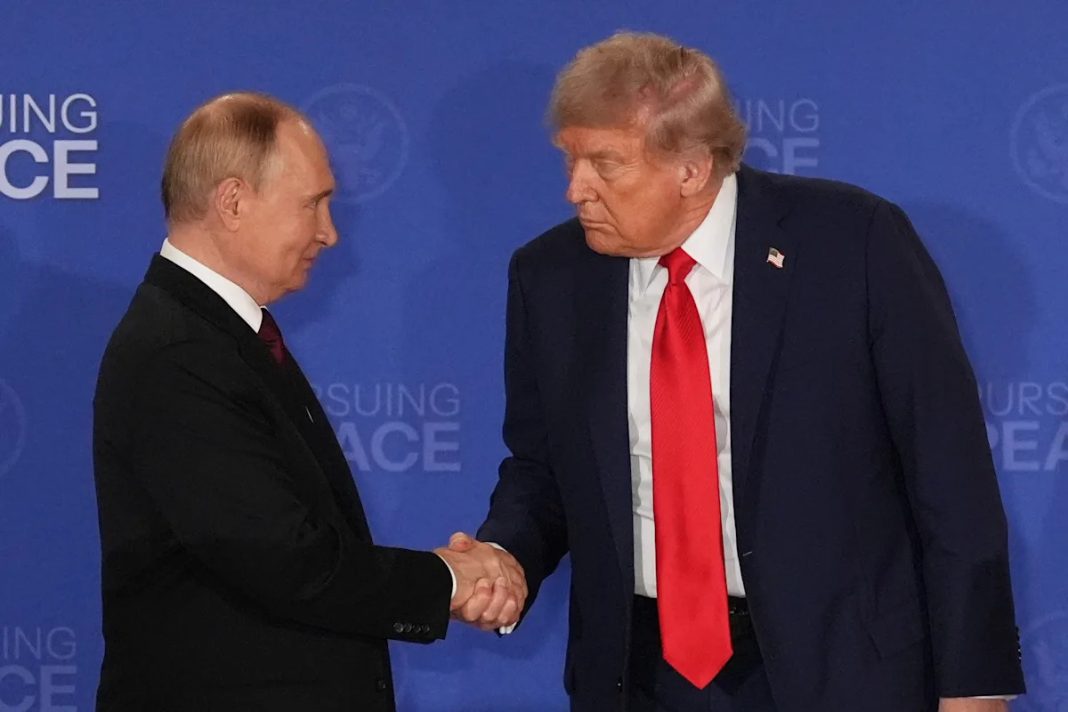President Donald Trump said he and Russian President Vladimir Putin agreed during a lengthy phone call Thursday to meet in Budapest to continue discussions about ending the war in Ukraine.
“I believe great progress was made with today’s telephone conversation,” Trump wrote in a social media post, where he also suggested that last week’s breakthrough on a Gaza peace deal could create diplomatic momentum.
“I actually believe that the Success in the Middle East will help in our negotiation in attaining an end to the War with Russia/Ukraine,” he wrote.
The meeting with Putin in Budapest, the president said, would follow an initial round of meetings between Secretary of State Marco Rubio with Russian counterparts next week at a location to be determined.
The call with Putin, which press secretary Karoline Leavitt said lasted more than two hours, came ahead of Trump’s scheduled White House meeting Friday with Ukrainian President Volodymyr Zelenskyy, who has said he’s hoping to convince the U.S. to provide Tomahawk missiles and other weapons systems that would enable Ukraine to attack deeper into Russia.
While Trump said in his post that he and Putin “will meet” in Budapest, Leavitt later called it a “very likely” meeting.
Trump, who has floated that he could provide Tomahawks to Ukraine if Putin continues to spurn his efforts to end the war, made no mention in his post on TruthSocial of any additional repercussions toward Russia.
But he has not publicly ruled out the possibility of granting Zelenskyy’s request.
Trump, who has been searching for new ways to pressure Putin, announced Wednesday that he’d received a promise from Prime Minister Narendra Modi that India would halt its purchasing of Russian oil, something he noted would take months if not years. India has not confirmed that conversation.
A bipartisan group of at least 10 lawmakers have signed onto a letter circulating Thursday that urges Trump to approve the Tomahawk cruise missiles for Ukraine, impose tougher sanctions on Russia and press Moscow to return thousands of abducted Ukrainian children.
The letter was led by the Republican and Democratic co-chairs of the House Ukraine Caucus, as well as Reps. Tom Suozzi (D-N.Y.) and Michael McCaul (R-Texas). They argue those steps would give Kyiv leverage in peace talks with Russia and reinforce Trump’s “peace through strength” strategy.
They also call for Trump to greenlight more Patriot air defense systems, F-16 upgrades and Advanced Precision Kill Weapons Systems, which turn standard rockets into guided munitions.
At the same time, GOP lawmakers and the White House are discussing a timeline for taking action on a bipartisan bill to increase sanctions on Russia that Trump has thus far shelved in hopes of a diplomatic breakthrough with Putin. And Defense Secretary Pete Hegseth this week told NATO counterparts that the U.S. will “impose costs on Russia” if it doesn’t take steps to end the war.
Despite Trump’s growing frustration with the Russian leader’s unwillingness to negotiate an end to the war, his post following the call conveyed warmth toward Putin, who, the president said, congratulated him for achieving a preliminary ceasefire in Gaza and thanked First Lady Melania Trump “for her involvement with children.”
A meeting in Budapest, if it happens, would be a remarkable coup for the Russian leader just months after he and Trump met in Alaska, where Putin was welcomed with a red carpet and military flyover only to make no real concessions during three-plus hours of direct talks. Although Trump claimed days later after convening European leaders and Zelenskyy at the White House that Putin had agreed to meet the Ukrainian leader face to face, no meeting occurred.
It was unclear from Trump’s post how the two leaders settled on Budapest, a city the White House has eyed as a potential meeting location for months — and a location that carries deep symbolism for both Russia and Ukraine.
Under the Budapest Memorandum in 1994, Ukraine agreed to give up its Soviet-era nuclear weapons in exchange for security assurances from Russia, the U.S. and Great Britain — assurances that didn’t hold up after Russia’s invasions of Ukraine in 2014 and 2022 were not countered by the U.S.
Sophia Cai and Joe Gould contributed to this report.

